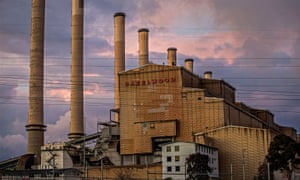Engie tells French senate committee that it plans to withdraw from coal-fired power generation and is looking at possible shutdown of Victoria’s Hazelwood power station

The Hazelwood coal-fired power plant in Victoria may be closed or sold by its owner, French utility Engie, as part of its move away from operating any coal-fired plants, the company said on Wednesday.
Engie’s chief executive, Isabelle Kocher, told a French senate committee on Wednesday that the utility planned a gradual withdrawal from coal-fired power generation in the coming years and that following the sale announced earlier this year of two plants in Indonesia and India the share of coal in its energy mix would fall to about 10% from 15%.
“For the Hazelwood plant, we are studying all possible scenarios, including closure, or a sale if the state of Victoria tells us that it cannot meet power-generating needs without this plant,” Kocher said.
Hazelwood, close to Melbourne, is supplied with lignite coal from an adjacent open-cut mine, which burned uncontrollably for weeks in early 2014.
Engie’s Australian unit was charged in court in February with failing to provide a safe workplace and ensure public safety over the fire.
Engie (formerly GDF Suez) acquired a majority stake in Hazelwood when it bought UK utility International Power in 2012 and currently owns 72% with Japanese group Mitsui & Co holding 28%.
Environment Victoria campaigns manager, Dr Nicholas Aberle, said it was time for the Victorian government and Engie to work together on a timetable for the phase-out of Hazelwood.
“Victoria currently has an over-supplied electricity market,” he said. The Australian Energy Market Operator estimates we have 2000 MW more generating capacity than we need.
“Hazelwood is 1600 MW. The incumbent coal-burning power stations are blocking investment in renewable energy in Victoria. Its time they started making way so that Victoria can benefit from the jobs and investment that will come with new renewable energy projects.
“Burning brown coal is 50% of Victoria’s climate pollution, and we need to urgently cut this pollution if we’re going avoid the worst of global warming.”
In its recent state budget, the Victorian government provided $40m in to start diversifying the Latrobe Valley economy.
“The transition from coal to renewable energy is inevitable, but we need to speed it up, at the same time as looking after the workers and communities who have been so important to powering the state,” Aberle said.
In recent months Engie had already closed the equivalent of 1.6 gigawatts worth of coal-fired plants in Europe, notably in Belgium and Britain, Kocher said.
She said a second option would be to convert some of its remaining coal-fired plants to burning biomass, which is deemed to be a renewable fuel.
She said that in developing countries like Indonesia which still rely heavily on coal and where Engie has efficient coal plants, it would sell rather than close these plants.
“Nearly half of the world’s power is still produced by coal, it will take years to reduce that,” she said.
The World Coal Association estimates that coal currently fuels about 41% of global electricity production.
Kocher, appointed earlier this month, wants to focus the utility on renewable energy, grids and energy services

